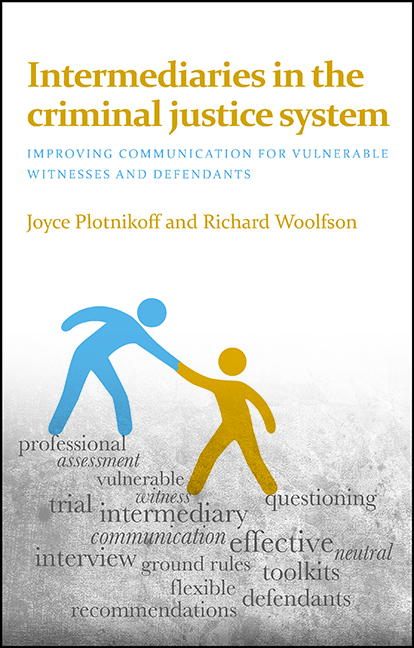 Intermediaries in the Criminal Justice System
Intermediaries in the Criminal Justice System Book contents
- Frontmatter
- Contents
- About the authors
- The Nuffield Foundation
- Acknowledgements
- Foreword
- one Introduction: a fresh pair of eyes
- two The intermediary scheme in England and Wales
- three Behind the scenes: planning to assess the witness
- four Assessment methods and involvement of the interviewer
- five Communication aids and stress reduction strategies
- six Contributing to the effectiveness of the police interview
- seven Negotiating professional space at the ground rules hearing
- eight Making the ground rules hearing effective
- nine ‘Every reasonable step’: preparation for giving evidence
- ten Cross-examination: research, case law, training and regulation
- eleven Cross-examination: intervention at trial
- twelve Cross-examination: challenges at the cutting edge
- thirteen The uneasy position of vulnerable defendants
- fourteen A new profession
- fifteen Conclusion
- References
- Index
- Table of cases
- Legislation
- Rules
- Practice directions
Foreword
Published online by Cambridge University Press: 08 March 2022
- Frontmatter
- Contents
- About the authors
- The Nuffield Foundation
- Acknowledgements
- Foreword
- one Introduction: a fresh pair of eyes
- two The intermediary scheme in England and Wales
- three Behind the scenes: planning to assess the witness
- four Assessment methods and involvement of the interviewer
- five Communication aids and stress reduction strategies
- six Contributing to the effectiveness of the police interview
- seven Negotiating professional space at the ground rules hearing
- eight Making the ground rules hearing effective
- nine ‘Every reasonable step’: preparation for giving evidence
- ten Cross-examination: research, case law, training and regulation
- eleven Cross-examination: intervention at trial
- twelve Cross-examination: challenges at the cutting edge
- thirteen The uneasy position of vulnerable defendants
- fourteen A new profession
- fifteen Conclusion
- References
- Index
- Table of cases
- Legislation
- Rules
- Practice directions
Summary
In 2004 Lord Judge warmly welcomed In Their Own Words, the seminal study of the giving of evidence by young witnesses written by Dame Joyce Plotnikoff and Dr Richard Woolfson. Following on from that, the implementation of the government’s commitment to improve the position of young witnesses giving evidence was the subject of a further study in 2009 by the same authors and entitled Measuring Up. I warmly welcomed that further study and added in my foreword that, if we were to have the good fortune of having the benefit of another study by the same authors half a decade hence, I hoped that it would show that real change had been achieved. Half a decade hence we do indeed have the good fortune of a new study directed to one of the commitments – the role of an intermediary.
In writing Intermediaries in the Criminal Justice System the authors have produced a work that comprehensively explains the origin of the concept and the way the role of the intermediary has been developed under the provisions of the Youth Justice and Criminal Evidence Act 1999. Its detailed chapters give the invaluable guidance that only these authors can give. Reflecting their characteristic style, the book is accessible and very human. A particularly welcome aspect is the way the role of intermediaries is brought to life in the intermezzo that ends each chapter. It is a book that works on many levels: rigorous and thoughtful enough for those who work in the criminal justice system, yet understandable and engaging for those who have a more general interest.
Besides being a guide it is an incisive and clear evaluation of the practical working of the scheme some 10 years after the scheme was introduced by the Home Office by way of a pilot. It is a truism that change is not just about having a new framework and new legislation in place, but about the change in culture necessary to make the new legislation and framework a reality. It is evident in 2015 that some of the ideas that would have seemed radical at the outset of the intermediary pilot have been absorbed into the culture of criminal proceedings.
- Type
- Chapter
- Information
- Intermediaries in the Criminal Justice SystemImproving Communication for Vulnerable Witnesses and Defendants, pp. xiii - xivPublisher: Bristol University PressPrint publication year: 2015


